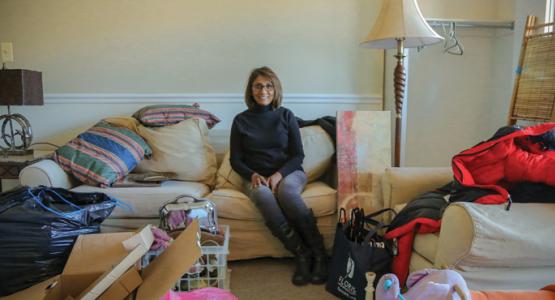
May 2018 Feature: Finding Home
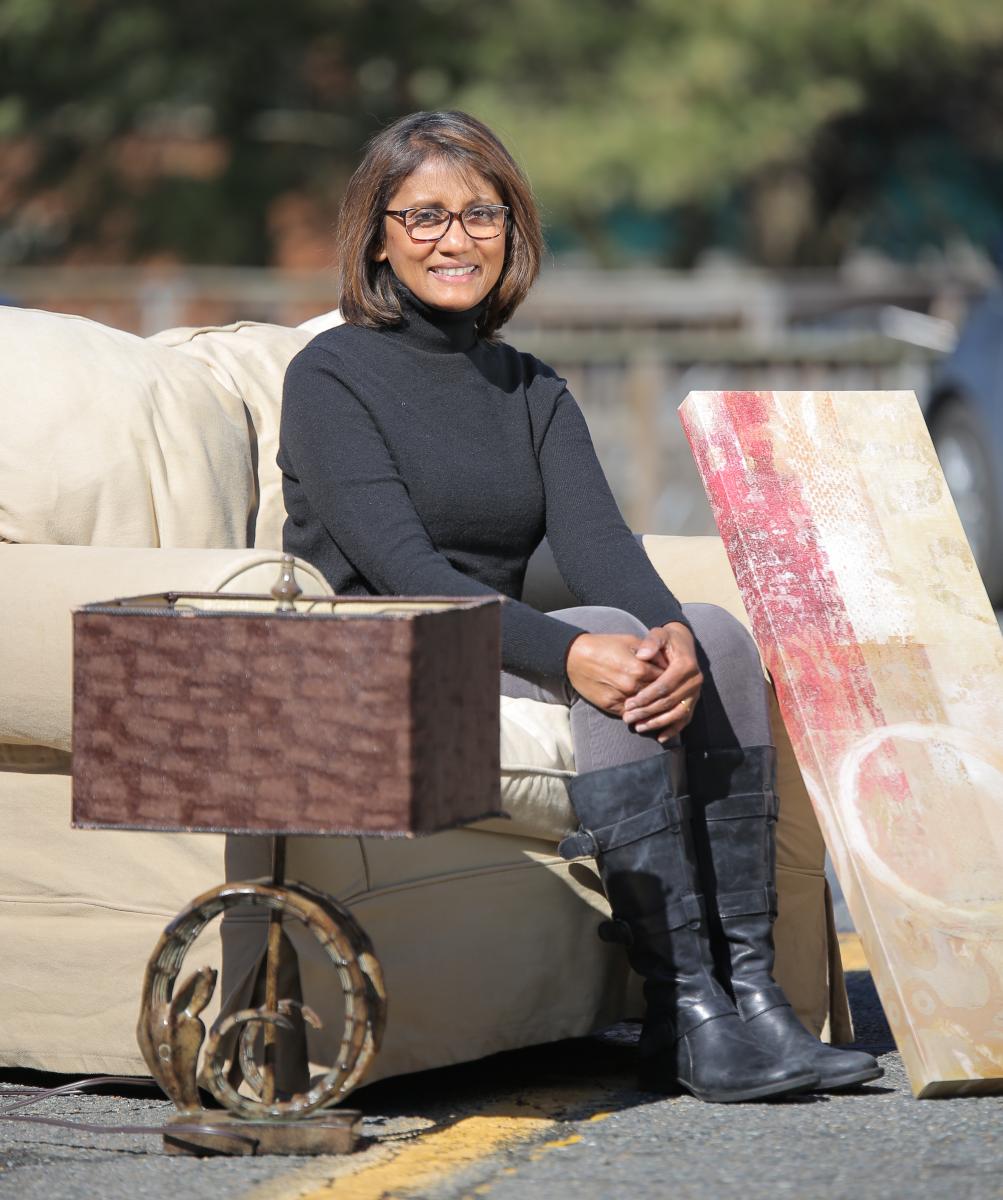 Story by Sylvia Garcia Urrutia
Story by Sylvia Garcia Urrutia
Hannah Koilpillai fondly remembers when, as a child, she came to the U.S. as an immigrant and treasures the woman who helped her family adjust to living here. “She acclimated us to our new environment [and] treated us as one of her family members,” she says. “Because of the positive experience I had and the love my family was shown, it made it so much easier to live in a new country.”
Koilpillai, a member of the Potomac Conference’s Sligo church in Takoma Park, Md., says she understands what refugees go through when coming to a new country, and wants to pay forward the help her family received when they arrived. When a friend told her about a group that was helping to resettle refugees, she immediately wanted to get involved.
Several Mondays a month, Koilpillai (pictured below with Nicholas Grossman) joins a volunteer group from the National Community church in Washington, D.C., as they help set up apartments for incoming refugees. Prior to a refugee family’s arrival, she goes to their empty apartment and transforms it into a welcoming home. “We make sure that the apartments are fully furnished and ready for the refugees to move in,” she says. “In order to do this, we, the volunteers, collect or donate items that are necessary to furnish the apartment.”
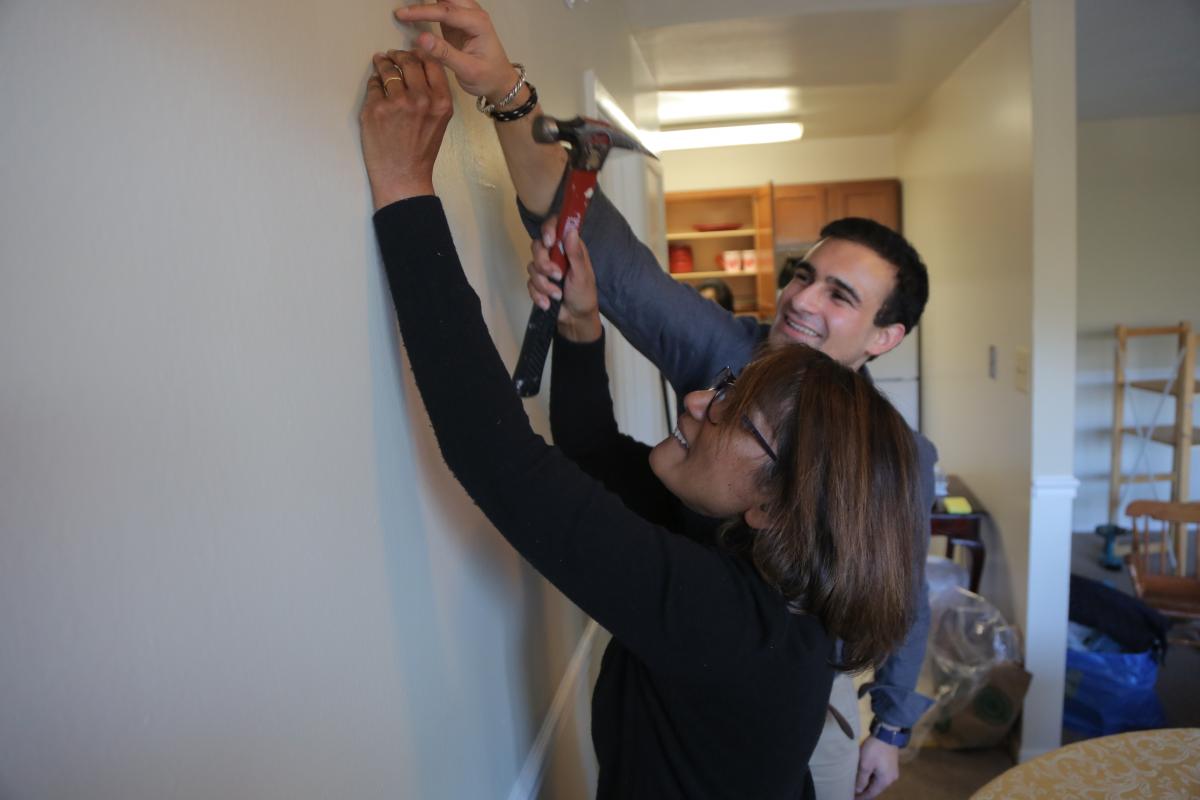 Koilpillai realizes that this refugee ministry goes beyond the convenience of having furniture to sit on and plates to eat from. “They feel welcomed. They see the love and care that has been put into making it a warm and comfortable place they can call home. We even hang pictures on the walls and try to make it personal. When you are leaving your roots and coming to a new country, especially when you are not sure if you are welcomed because of the country you are coming from, [you might have] reservations on how people will perceive your presence in their country. [But] then seeing how inviting and warm the home has been set up just for them removes all those thoughts.”
Koilpillai realizes that this refugee ministry goes beyond the convenience of having furniture to sit on and plates to eat from. “They feel welcomed. They see the love and care that has been put into making it a warm and comfortable place they can call home. We even hang pictures on the walls and try to make it personal. When you are leaving your roots and coming to a new country, especially when you are not sure if you are welcomed because of the country you are coming from, [you might have] reservations on how people will perceive your presence in their country. [But] then seeing how inviting and warm the home has been set up just for them removes all those thoughts.”
Koilpillai shares that their purpose is to serve. “We aren’t here helping in order to convert them. We are here to serve,” she says.
Koilpillai is always accepting and looking for donations for furnishing the apartments. Anyone interested in making a donation can reach her at hkoilpillai56@gmail.com.
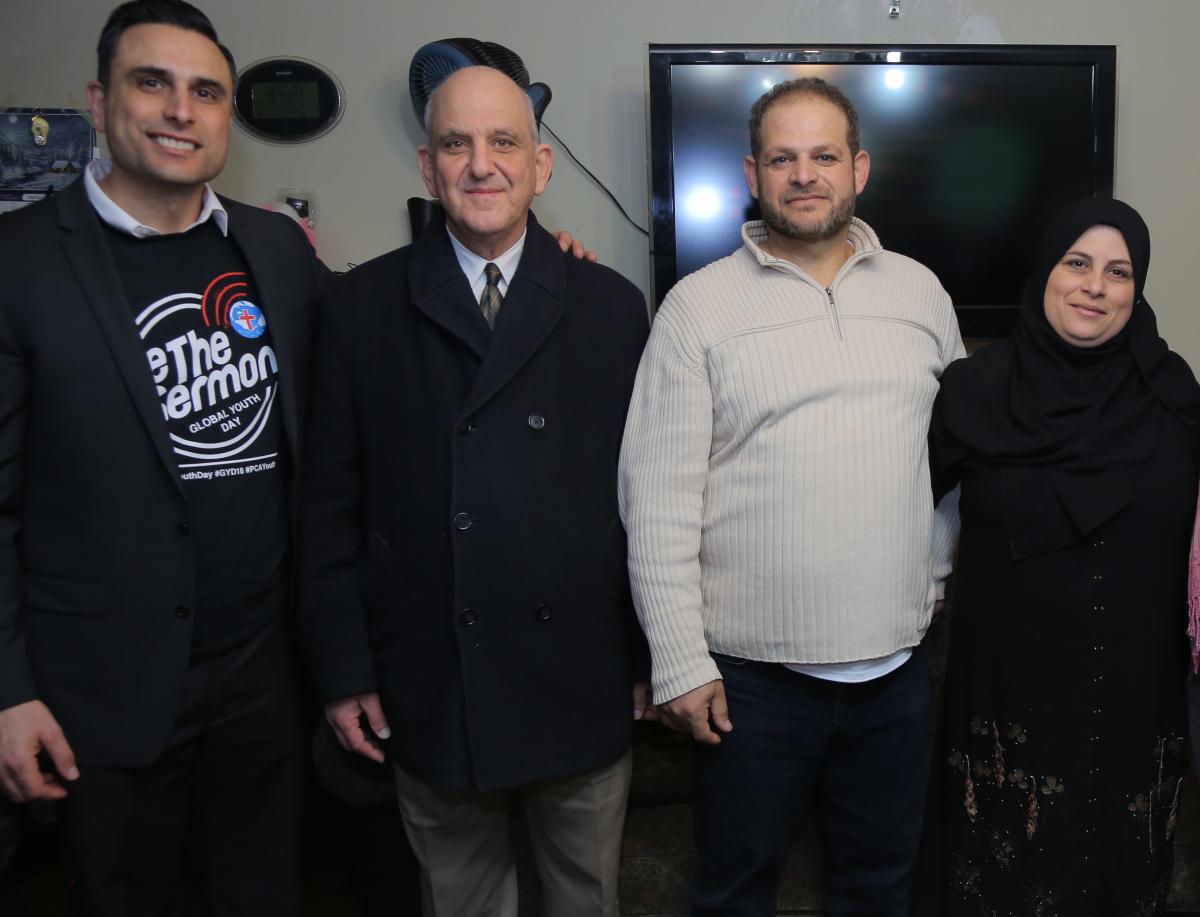 Sparking a Movement
Sparking a Movement
Anees Abdelnour (pictured above, second from left, with Joseph Khabbaz, a Sligo pastor, and Basheer and Ghosoun), another member of Sligo, knows what it is like to move to a new country and be in need. In 1974 with only $50, he and his mother moved to the U.S. from Jordan. They lived in a small apartment in Takoma Park with his sister, her husband and their three children. Now he is helping other newcomers.
In September 2016, Abdelnour visited several mosques near the General Conference, where he works, to see how he could help Muslim refugees arriving in the area. After visiting several mosques, one directed him to a center that helps incoming refugees. A short time later, he and a few other General Conference employees visited the center and provided boxes of food and supplies. He had a desire to meet with an actual family and help them directly, but the center cited privacy rules and could not give any names or addresses. Abdelnour continued to visit often, taking food and supplies.
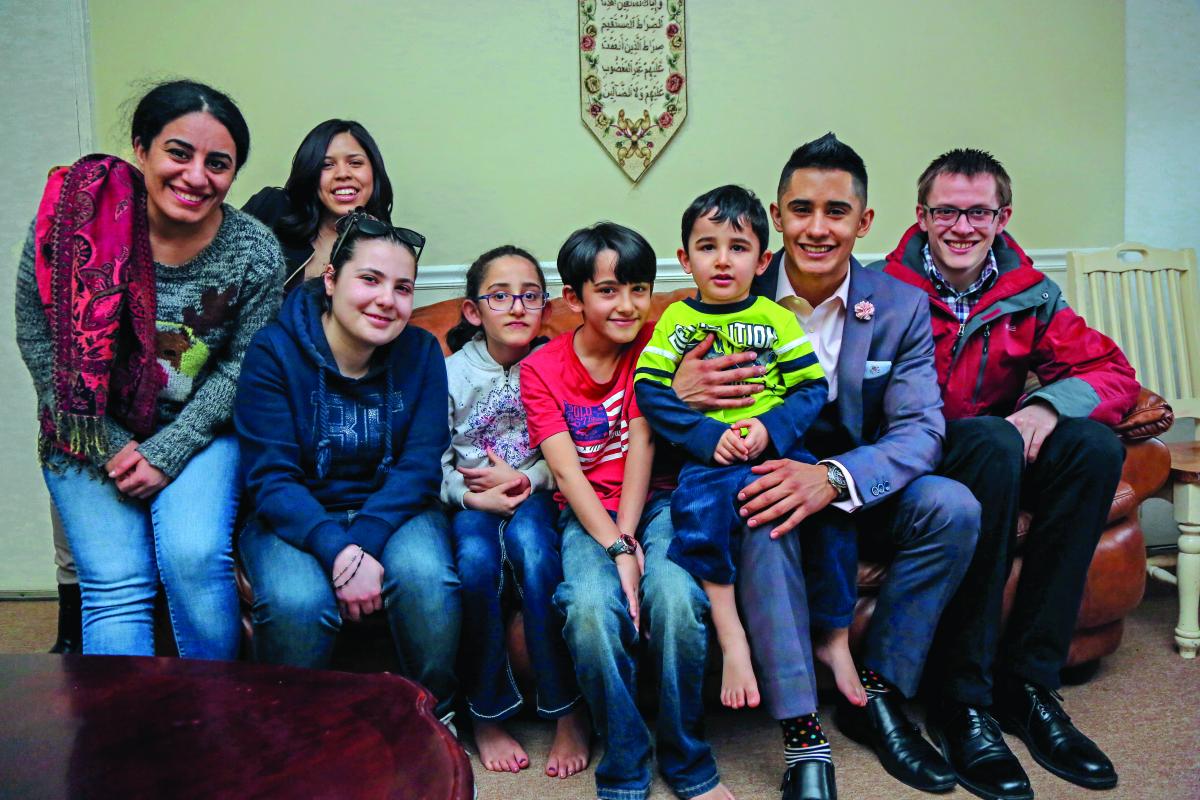 About a year after Abdelnour’s first visit to the mosques, Sligo church member Hannah Koilpillai approached him at church after learning he spoke Arabic. Abdelnour knows it was a providential meeting. “Hannah reached out to me and asked me to translate for a Syrian refugee family. She had no idea that I was helping refugees or that I wanted to meet a family.
About a year after Abdelnour’s first visit to the mosques, Sligo church member Hannah Koilpillai approached him at church after learning he spoke Arabic. Abdelnour knows it was a providential meeting. “Hannah reached out to me and asked me to translate for a Syrian refugee family. She had no idea that I was helping refugees or that I wanted to meet a family.
She just needed someone to translate. That was my chance to meet with a family!” He immediately agreed to help, and this opened the doors for him to finally start personally helping refugee families. The family he translated for provided names and addresses of other refugee families in need within the same apartment complex. He shares that “there [were] about 100 refugee families there. That’s about 600 people!”
It wasn’t long until he gathered food and supplies, and, with a group from Sligo (Sligo Young Adults are pictured with Syrian children above) and Washington Adventist University in Takoma Park, Md., jumped into action. The group helped this family and seven other families with donated household items, cleaning supplies and basic food staples. A dentist from the church also offered free dental services. Abdelnour says more church members are getting involved.
The people they’re helping include a Syrian refugee family of five. The father, who was an engineer in Syria, now does handyman work. The mother and two sons run a catering business. They say the most difficult adjustment has been the limited space in their small apartment, stress of seeking employment and opportunities for sending their children to school. They also report a lack of government follow-through on promises for food stamps and other assistance.
“I was happy when I first found out we were coming to the United States, but after we arrived, I became sad all the time because I didn’t know anyone and we didn’t have any food,” says Ghosoun, who preferred not to share her last name. “But now that I am visited by Anees and Hannah and everyone else, I am now happy again. It’s like having family in a foreign country!”
Abdnelour is thankful for the opportunity to help refugee families in his community and wants to see more church members get involved. “I’m hoping more people get inspired to help,” he says. For a list of specific needs, contact Abdnelour at abdelnoura@gc.adventist.org.
Caring for Body and Soul
 Soon after arriving in Lancaster, Pa., Amour Pacifque tried his first share of roasted Brussels sprouts, butternut squash, asparagus, red beets, zucchini, sweet potato and artichokes, when Wendy Evans, a member of the Pennsylvania Conference’s Lancaster church, brought the dish to his home. His family, refugees from the Congo, had never eaten these vegetables, let alone used an oven to cook them. Evans took them grocery shopping, came to their home, showed them how to use the oven and how to make the dish.
Soon after arriving in Lancaster, Pa., Amour Pacifque tried his first share of roasted Brussels sprouts, butternut squash, asparagus, red beets, zucchini, sweet potato and artichokes, when Wendy Evans, a member of the Pennsylvania Conference’s Lancaster church, brought the dish to his home. His family, refugees from the Congo, had never eaten these vegetables, let alone used an oven to cook them. Evans took them grocery shopping, came to their home, showed them how to use the oven and how to make the dish.
“Talking and working with them reminded me of going camping and cooking over the fire—only they did it out of necessity,” says Evans, who shared that she experienced a form of culture shock when living [in another country] for three weeks. “It is very challenging to live somewhere you do not know the language very well and try to communicate with the people around you.”
Since 2013, 1,300 refugees have found a new home in Lancaster, Pa., sometimes called “America’s Refugee Capital,” taking in 20 times more refugees per capita than the rest of the U.S., according to a BBC report. About three years ago, the first Congolese refugee family walked into the Lancaster church. They didn’t speak a word of English, and no one at the church spoke Kinyarwanda, their native language. Church member Vickie Binkley remembers when they first arrived: “We couldn’t communicate with them, and it was frustrating ... but every Sabbath they came and sat in the pew, and they were always happy.” Sometime later, another family who spoke some English began attending, so the church members were finally able to communicate with the initial Congolese family.
After spending nearly 20 years in refugee camps in Zambia, Rwanda and Uganda, they needed help adjusting to life in America.
Shortly after the families began attending the Lancaster church, members started caring for them in a variety of ways. Some members pick up refugee families each Sabbath to bring them to church, while others go to area farms, buy large quantities of vegetables and fruits and deliver boxes of food to them. One group prepared a refugee family’s windows for the winter to help reduce their heating costs.
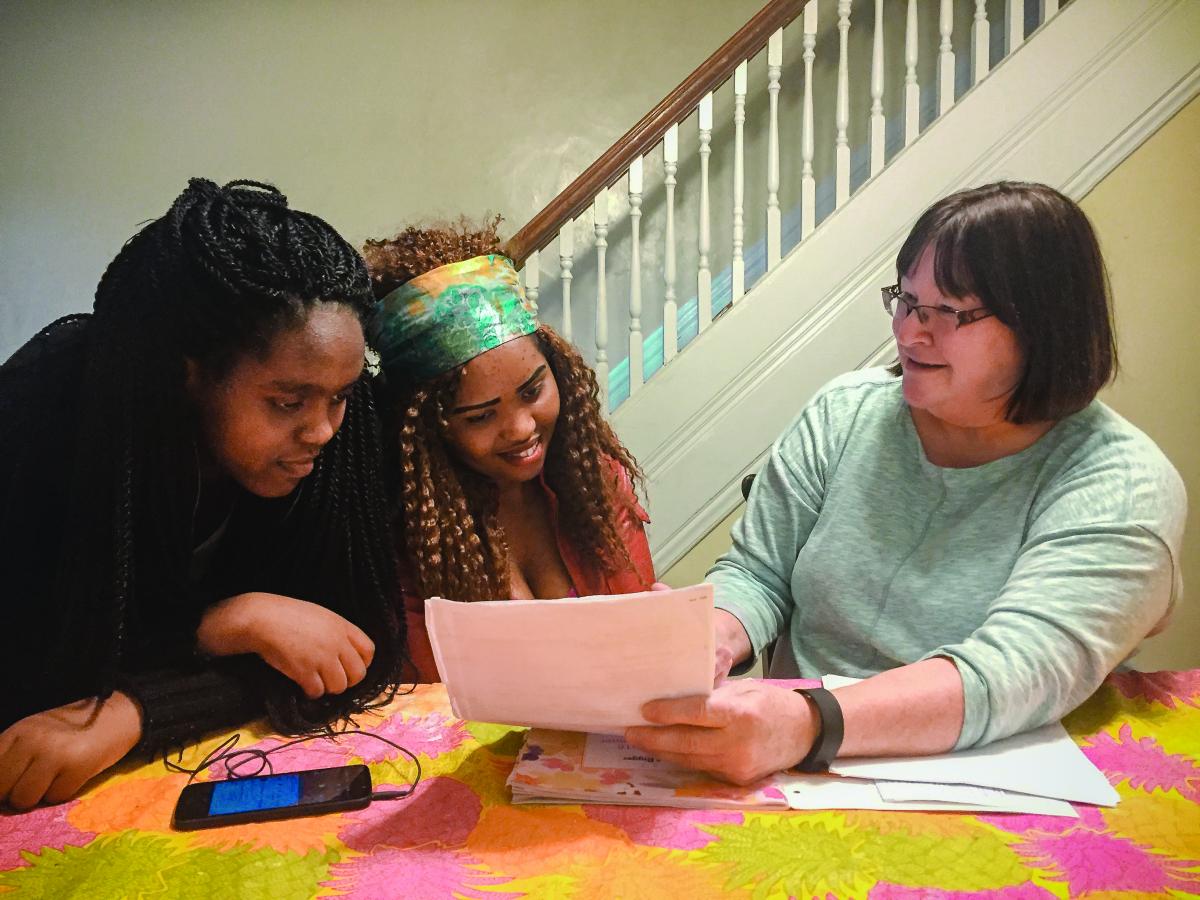 Binkley (pictured right with Congolese refugee members Mukunzi Uwamahoro and Emmaculee Uwizeye), in particular, quickly became a friend to the refugees and considers them her family. She says, “[They] need help with life skills like shopping and cooking. They don’t use their ovens because it’s just not how they’ve cooked. At the refugee camps, they cooked over open fire. They need help with other things, like learning how to use the heating systems in their houses ... and how to pay their bills.” She has even started learning the basics of Kinyarwanda, like days of the week, the word “doctor” and other words that have helped her relate to them better.
Binkley (pictured right with Congolese refugee members Mukunzi Uwamahoro and Emmaculee Uwizeye), in particular, quickly became a friend to the refugees and considers them her family. She says, “[They] need help with life skills like shopping and cooking. They don’t use their ovens because it’s just not how they’ve cooked. At the refugee camps, they cooked over open fire. They need help with other things, like learning how to use the heating systems in their houses ... and how to pay their bills.” She has even started learning the basics of Kinyarwanda, like days of the week, the word “doctor” and other words that have helped her relate to them better.
Helping the refugees is a labor of love for Binkley. “I feel like they’ve helped me more than I’ve helped them. They are always happy. Even with everything they have been through, they are still happy,” Binkley notes.
Currently nine refugee families are attending the Lancaster church, and now comprise one third of the congregation. “About half of these refugees might not understand English, but they still come to church faithfully each week. Our pastor has offered them their own service, but they don’t want their own service; they say they need to stay in the main service to learn English. They do have their own Sabbath School now, and it’s the largest Sabbath School class in the church. The Sabbath School teacher is a gentleman who was a lay pastor at the refugee camp. This year he was also appointed as an elder at the church,” states Binkley.
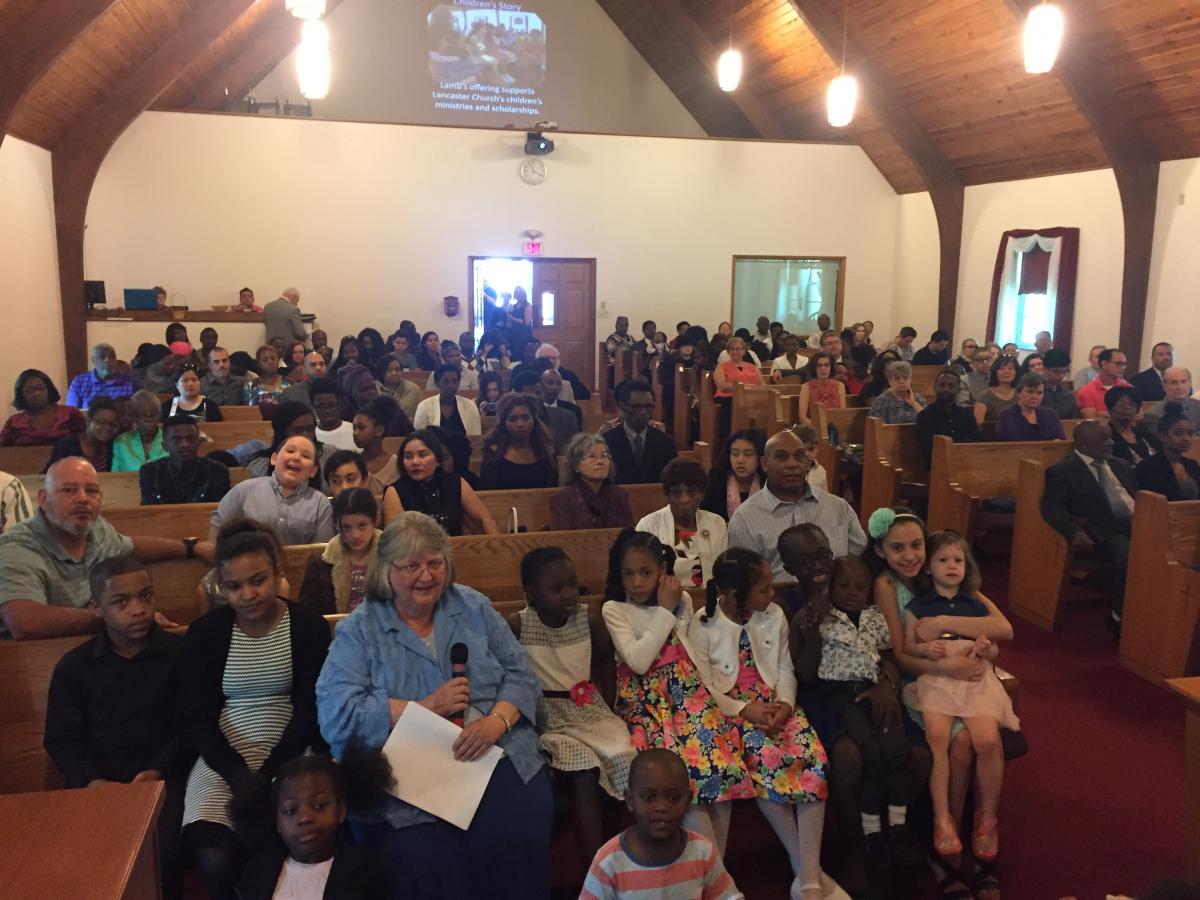 Pastor Thomas Hennlein is excited about the changes the refugees and other families from Vietnam, Haiti and Ethiopia have brought to his congregation. “The church has become very multicultural now. I like that.”
Pastor Thomas Hennlein is excited about the changes the refugees and other families from Vietnam, Haiti and Ethiopia have brought to his congregation. “The church has become very multicultural now. I like that.”
The young people are also eager to get involved. Seven of the teens recently chose to be baptized, and this year, two youth have started a Pathfinder group for the church.
Hennlein adds that embracing the refugee families has helped inspire his congregation to seek out more creative ways to minister also to the community. Our church, before the refugees got here, was complacent—coming to worship, staying for potluck and maybe reading their Sabbath School lesson during the week, says Hennlein. “I know God will really bless us as we reach out to help others. As we start helping those who are close to us that are of the same faith, then we start seeing other needs and thinking about helping other people. ... It’s having a good effect.”

Add new comment